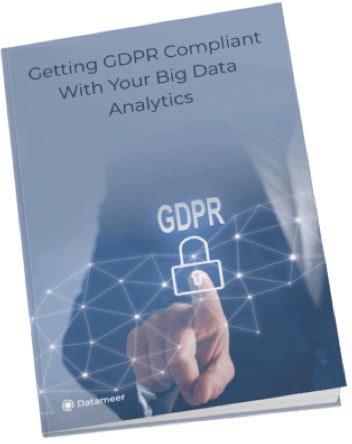
Getting GDPR Compliant with Your Big Data Analytics
With a great deal of personal data being used in big data analytics, you must choose a platform that provides the deepest functionality to ensure you are GDPR compliant while still lowering the administrative burn needed to manage compliance processes. Datameer fits the bill.

About the Getting GDPR Compliant with Your Big Data Analytics Ebook
In April 2016, The European Commission ratified The General Data Protection Regulation (GDPR), which covers the capture, control, and consent to use personal information. Specifically, GDPR broadens the scope of personal privacy laws to protect the data rights of EU citizens.
As the complexity of IT networks has grown, the inventiveness and sophistication of cybersecurity threats and attacks have grown quickly, too. The level of exposure is unsettling by itself. The General Data Protection Regulation (GDPR) is enforceable with fines equal to 2 percent of an entity’s global gross revenue for violations of record-keeping, security, breach notification, and privacy impact assessment obligations. This offers companies no other choice but to take notice and absolutely ensure compliance.
Threat and Impact
GDPR affects all personal data and changes the way entire organizations interact with Personally Identifiable Information (PII).
GDPR Complexities
Single and Multiple Points of Failure. Right to be Forgotten.
GDPR Success Factors
Governed, secure and accurate data allows businesses to function at a high level of confidence.
Four Key Aspects of GDPR Governance
Discover. Secure and Govern. Monitor and Manage. Comply.
GOVERNING ANALYTICS FOR GDPR COMPLIANCE
Big data complicates the process of maintaining compliance with regulations such as GDPR and other privacy rules. A tremendous volume of data is transformed into many different intermediate forms and used in many different ways. Each of these aspects must be managed, tracked, and reported.
GDPR also provides an opportunity to put together a more comprehensive governance capability that provides more than just compliance. It enables trust and confidence in the data and drives faster more collaborative analytics processes.
COMPLY
Complying with GDPR requires proof that proper controls and processes are in place to secure the private data and use it properly according to individuals’ consent. However, with an ever-growing volume of data and increasing analytics on this data, manual processes reporting GDPR compliance can become a large resource drain on an already taxed IT staff.
Datameer provides full logging and auditing services to track all activity. This includes user action and behavior logs and security audit logs. In addition, reports can be generated on the activity data.
Organizations are consolidating GDPR processes in central repositories, cataloging solutions, or IT control systems such as GitHub. This enables an enterprise-wide view of all personal data, its use, and how it’s managed. In addition, this simplifies and streamlines the auditing and reporting processes for GDPR.